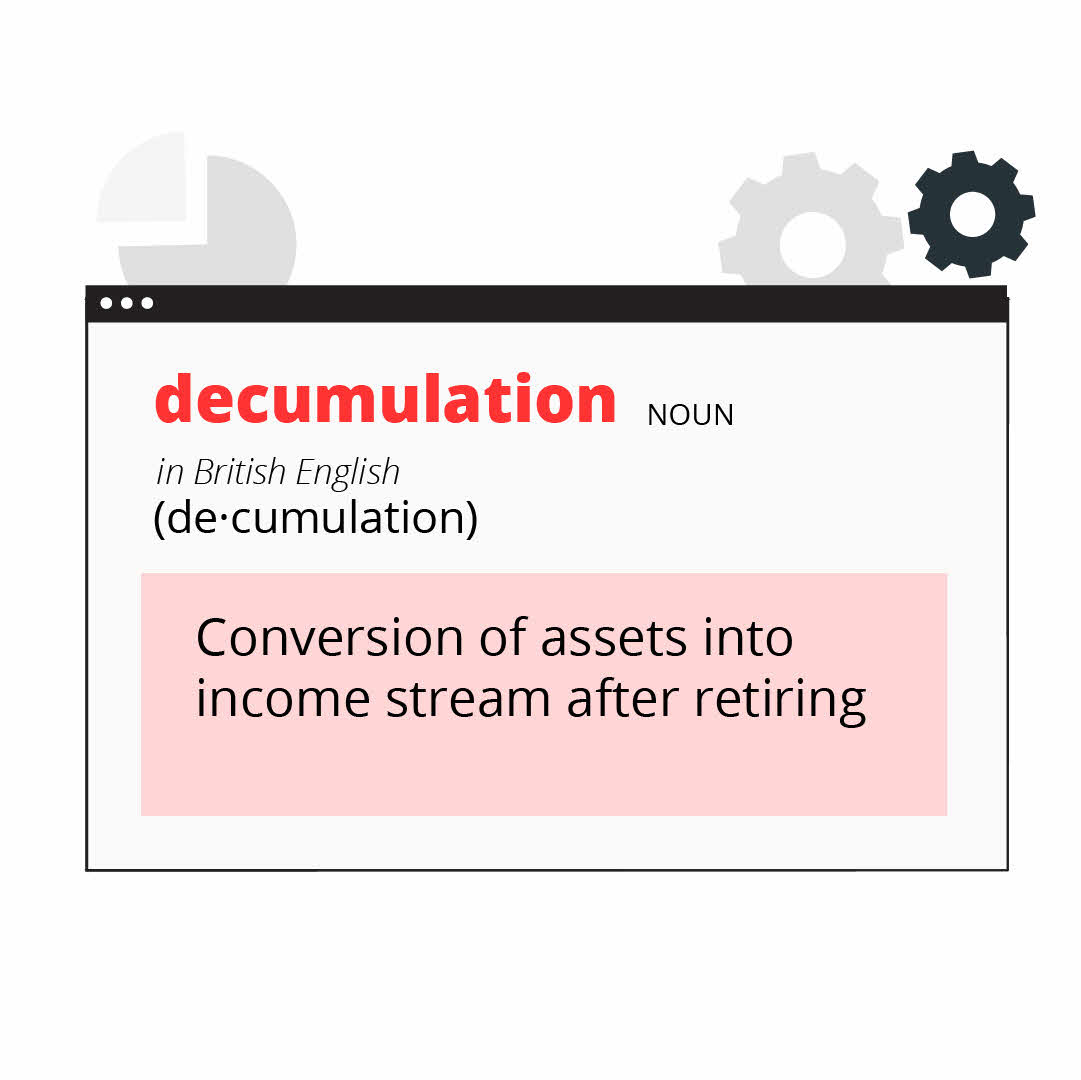Retire well by decumulating wisely
By Lorna Tan
![]()
If you've only got a minute:
- The decumulation phase refers to the conversion of our assets into income streams to fund our retirement.
- As we face the prospect of a longer lifespan, we are encouraged to continue to invest and make our money work hard even after we retire.
- By having a realistic projection of income flows and expenses, we can enjoy the decumulation phase with greater confidence and peace of mind.
![]()
The Covid-19 pandemic is a timely stress-test on how resilient and sustainable our passive income flows are. For pre-retirees and retirees, this is critical because your financial security during your golden or financial freedom years depend largely on these cashflows.
For instance, if you are planning to rely largely on rental income to fund your retirement lifestyle, you may find yourself in a tight spot if your tenants are asking for rent reductions or are terminating their leases because they have lost their jobs.
Accumulation phase
Most of us know that we need to make our money work harder to beat inflation and achieve gains to accumulate our wealth over the long-term whilst making time our ally to enjoy the power of compounding. Investments can include equities, unit trusts, robo-advisers like digiPortfolio and regular investing-type plans like Invest-Saver.
Read more: Is DCA or lump-sum investing better for you?
Find out more about: Retirement digiPortfolio
Decumulation phase
When we retire, the focus shifts from accumulating wealth to that of drawing down from our assets to fund our expenses. We want to do so optimally so that we do not risk outliving our financial resources. At the same time, we want to be able to enjoy a reasonable standard of living after working so hard and planning for a secure financial future. Some may desire to have excess beyond our lifetime to leave as a legacy for our loved ones.

You may be familiar with the term “decumulation”, which refers to the conversion of our assets into income streams to fund our needs and wants when we have left the workforce. Many people are realising that planning for decumulation is more complex.
When we move into the decumulation phase, we would either have semi-retired or stopped working altogether. With little or no employment income coming in, we would be more dependent on the passive income flows that we can convert from our accumulated wealth. By then, we are likely to face less employment opportunities due to age, irrelevant skillsets, or declining health conditions.
As we face the prospect of a longer lifespan, we are encouraged to continue to invest and make our money work hard even after we retire. Nevertheless, it pays to be mindful that not all investments carry the same level of risk so do stay diversified, build multiple income flows and consider the timeframe of your investments. By doing so, we can avoid or reduce the impact of the risk of a lower return when you are withdrawing money from your investments during a downturn.
So, set up your investments in a way that enables you to grow your savings and decumulate optimally for a more secure financial future.
Here are 9 considerations about decumulation.

1. Retirement income flows and expenses
As part of our retirement planning, it is prudent to do a realistic projection of our income flows and expenses during our golden years. Divide them into needs and wants and monitor them. As you deep dive into your income and expenses, do consider your insurance premiums especially for healthcare and long-term care. By reviewing them regularly, you get to imagine your desired retirement lifestyle and be realistic about it.
What will be the projected income flows that fund these needs and wants? When will they begin and the duration? For example, the penalty-free withdrawals from your SRS account can be spread out over 10 years or longer if they are in the form of annuity insurance payouts. If the statutory retirement age was 62 at the time that you made your first SRS contribution, the earliest you can commence your SRS penalty-free withdrawal is from age 62.
During retirement, it is likely that the first decade or so will see us incurring more travelling expenses as we would want to see the world while we are still physically mobile and healthy. Some may want to start their own business and will need capital to do that.
By having a realistic projection coupled with continuous monitoring of our assets and liabilities, we will have more clarity about when we can achieve financial freedom and enjoy the decumulation phase with greater confidence and peace of mind.
Read more: Retire smart with SRS
Find out more about: Supplementary Retirement Scheme (SRS) Investment

2. Guaranteed and non-guaranteed income flows
One decumulation strategy is to determine the nature and sustainability of your income flows during retirement. What proportion will be guaranteed and non-guaranteed? How much of your basic needs will be funded by guaranteed income flows? And how much of your wants will be funded by non-guaranteed income flows?
If you are very risk averse, you may want a higher portion of your passive income flows to be guaranteed and/or reliable to be able to fund all your needs and perhaps some of your wants.
Examples of guaranteed income would be our Central Provident Fund (CPF) payouts, withdrawals from our CPF accounts, SRS savings, annuity or retirement income insurance, cash and near cash assets like Singapore Savings Bonds, some bonds, annuity and/or retirement income, money market funds, index funds, and so on. Some people may consider rental income as a guaranteed/reliable income flow but do bear in mind that it is dependent on the availability of tenants.
Non-guaranteed income can come from riskier tools that are skewed toward variable returns like equities, some bonds, alternative assets like commodities, private equity funds and so on.
Read more: Investing according to your changing life stages
Find out more about: Retirement digiPortfolio

3. CPF payouts
For many, our CPF savings is the foundation of our retirement plan. Maximise your CPF savings by understanding how the various CPF schemes work. For instance, the CPF Board has a Retirement-Sum Topping Up scheme which enables us to perform top-ups to our (and our loved ones) CPF accounts.
If we are on the CPF LIFE scheme, these top-ups will ensure higher monthly payouts for life. If we are on the Retirement Sum scheme, they will increase the monthly payouts and/or extend the payout duration up to age 90. In addition, such cash top-ups to our (and loved ones) accounts will qualify us to enjoy personal income tax of up to S$8,000 per year.
4. Bucket strategy
One way of investing that spans across our retirement or financial freedom years is the bucket strategy comprising pots of money that are invested in different investment portfolios.
The first bucket will comprise a few years of income in zero or near zero risk savings, while the next bucket will have a higher proportion of fixed income tools for a duration of up to 7 or 10 years, and then a longer-term bucket with riskier and more volatile investments.
History has shown that long-term investing helps to ride out volatility and can potentially reap higher returns. Do note that this strategy will require the movement of money among the buckets.

5. Home planning
Most pre-retirees plan to repay their home mortgage fully - at least for their primary residence - by the time they retire. This is a prudent move as real estate is a big-ticket item and the mortgage would take up a substantial portion of our liabilities.
Our home can be source of equity to be tapped on during our retirement. Should the need arise, we can consider monetizing it via renting out spare rooms, downsizing or the Lease Buyback Scheme (LBS)1 if you own a HDB flat.
Through the LBS, you will be able to monetise your HDB flat to receive a stream of income in your retirement years, while continuing to live in it. You can sell part of your flat's lease to HDB and choose to retain the length of lease based on the age of the youngest owner. The proceeds from selling part of your flat's lease will be used to top up your CPF Retirement Account to increase your monthly payouts.
If you own a private home and are aged 65 to 79, you can consider the DBS Home Equity Income Loan as an avenue to unlock some cash while remaining in your home. If you are a Singapore citizen or PR, the DBS Home Equity Income Loan allows you to borrow against your fully paid private residential property to top up your CPF Retirement Sum in your CPF Retirement Account which will be used for the national annuity CPF LIFE scheme. This will result in higher monthly payouts for life to supplement your retirement funds.
Here are some key features:
- No monthly loan repayments, with the loan amount and accrued interest payable only at loan maturity
- Fixed interest rate of 3.88% p.a. throughout the loan tenure
- Loan tenure of up to 30 years - till you (or the youngest borrower in the case of a joint loan) reaches age 95
- Flexibility to sell the property anytime, and repay the loan with no penalty
- The minimum loan amount would be the amount needed for you to top-up your CPF savings to meet the Full Retirement Sum for your cohort (S$205,800 in 2024)
- The maximum amount that can be borrowed is the amount required to top-up to the prevailing CPF Enhanced Retirement Sum (S$308,700 in 2024)
6. Part-time work
If the thought of having zero employment income is daunting and you still enjoy what you are doing, perhaps working part-time will be a good way to ease into full-time retirement. It also acts as a buffer should things go sideways like during a market downturn.
Do note that you are still liable to pay your personal income tax in the first year of retirement (based on your earned income in the previous year), so income from your part-time job will come in nicely to fund this without tapping into your retirement income savings.
You can also pick up alternative skills and create new income opportunities. Continuous learning is a way of stimulating our grey cells and rejuvenating us in the process.
Read more: What happens when dementia hits

7. Estate Planning
As part of retirement planning, do remember to set up a proper estate plan that will help to reduce potential leakages from your estate and ensure proper distribution should you be mentally incapacitated or when you are no longer around. The common estate planning tools are a will, CPF Nomination, Lasting Power of Attorney, Trust and Advance Medical Directive.
Read more: The importance of estate planning
8. Digital tools and professional help
The DBS Plan & Invest tab in digibank is a digital advisory tool that goes beyond budgeting and helps you navigate your financial journey through life. Use the tool to arrive at a complete list of your assets and liabilities (even if some of them are with other financial institutions) and monitor how one financial decision may affect others. By doing so, there is greater transparency and you can make informed investment decisions to achieve financial wellness.
Planning for decumulation is important and the Map Your Money feature in Plan & Invest tab in digibank will help you in that process. It is also worth your time to plan your retirement with a Wealth Planning Manager who can offer advice and continual guidance.

9. Mental preparation
So be prepared to shift from a mindset of saving to spending or drawing down your assets. This is psychologically difficult for savers. If we do not make the shift successfully, we may run the risk of not enjoying the fruits of our hard-earned savings and investment gains during the accumulating phase. And we may risk leaving excessive wealth to our beneficiaries to a level that might not benefit them if it results in them leading irresponsible lives.
Ready to start?
Start planning for retirement by viewing your cashflow projection on Plan tab in digibank. See your finances 10, 20 and even 40 years ahead to see what gaps and opportunities you need to work on.
Speak to the Wealth Planning Manager today for a financial health check and how you can better plan your finances.
Source:
1 HDB, “Lease Buyback Scheme”, retrieved 10 Jan 2024.
Disclaimers and Important Notice
This article is meant for information only and should not be relied upon as financial advice. Before making any decision to buy, sell or hold any investment or insurance product, you should seek advice from a financial adviser regarding its suitability.








That's great to hear. Anything you'd like to add? (Optional)
We’re sorry to hear that. How can we do better? (Optional)